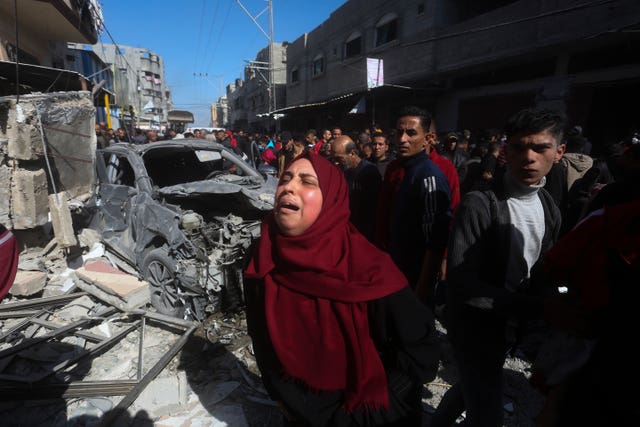
Clive Bull 1am - 4am
25 February 2024, 19:54

Israeli media reported that mediators were making progress on an agreement for a ceasefire.
An Israeli military offensive in the southern Gazan city of Rafah could be “delayed somewhat” if a deal for a weekslong ceasefire between Israel and Hamas is reached, Prime Minister Benjamin Netanyahu said on Sunday, but claimed that total victory in Gaza is “weeks away” once the offensive begins.
Mr Netanyahu confirmed to CBS that a deal is in process, with no details.
Israeli media reported that mediators were making progress on an agreement for a ceasefire and release of dozens of hostages held in Gaza as well as Palestinians imprisoned by Israel.
Several Israeli media outlets, citing unnamed officials, said the War Cabinet tacitly approved it.
Talks resumed on Sunday in Qatar, Egypt’s state-run Al Qahera TV reported, citing an Egyptian official as saying further discussions would follow in Cairo with the aim of achieving the ceasefire and release.
Meanwhile, Israel is developing plans for expanding its offensive against the Hamas militant group to Rafah on the Gaza-Egypt border, where more than half the besieged territory’s population of 2.3 million have sought refuge.
Humanitarian groups warn of a catastrophe, with Rafah the main entry point for aid, and the US and other allies have said Israel must avoid harming civilians.
Mr Netanyahu has said he will convene the Cabinet this week to approve operational plans for action in Rafah, including the evacuation of civilians.
“Once we begin the Rafah operation, the intense phase of the fighting is weeks away from completion, not months,” Mr Netanyahu told CBS. “If we don’t have a deal, we’ll do it anyway. It has to be done because total victory is our goal and total victory is within reach.”
He said that four of the six remaining Hamas battalions are concentrated in Rafah.

US national security adviser Jake Sullivan told NBC that US President Joe Biden had not been briefed on the Rafah plan and said: “We believe that this operation should not go forward until or unless we see (a plan to protect civilians).”
Heavy fighting continued in parts of northern Gaza, the first target of the offensive. Residents have reported days of heavy fighting in the Zaytoun neighbourhood of Gaza City.
“We’re trapped, unable to move because of the heavy bombardment,” resident Ayman Abu Awad said.
He said starving residents have been forced to eat animal fodder and search for food in demolished buildings. Northern Gaza has been largely cut off from aid, and the UN’s World Food Programme suspended deliveries last week.
Philippe Lazzarini, commissioner general of the UN agency for Palestinians, said they have not been able to deliver food to northern Gaza since January 23, adding on X, formerly Twitter, that “our calls to send food aid have been denied”.
Israel said 245 trucks of aid entered Gaza on Sunday — less than half the amount that entered daily before the war.
A senior official from Egypt, which along with Qatar is a mediator between Israel and Hamas, has said the draft ceasefire deal includes the release of up to 40 women and older hostages in return for up to 300 Palestinian prisoners, mostly women, minors and older people.
The official, speaking on condition of anonymity to discuss the negotiations, said the proposed six-week pause in fighting would include allowing hundreds of trucks to bring desperately needed aid into Gaza every day, including the north.
He said both sides agreed to continue negotiations during the pause for further releases and a permanent ceasefire.
Negotiators face an unofficial deadline of the start of the Muslim holy month of Ramadan around March 10, a period that often sees heightened Israeli-Palestinian tensions.
Hamas says it has not been involved in the latest proposal developed by the US, Egypt and Qatar, but the reported outline largely matches its earlier proposal for the first phase of a truce.
Hamas has said it will not release all the remaining hostages until Israel ends its offensive and withdraws its forces from the territory, and is demanding the release of hundreds of Palestinian prisoners, including senior militants — conditions Mr Netanyahu has rejected.